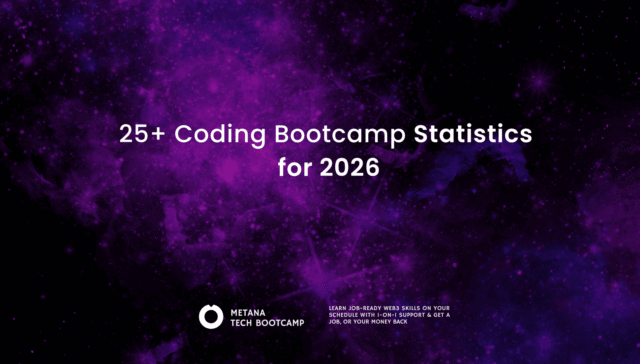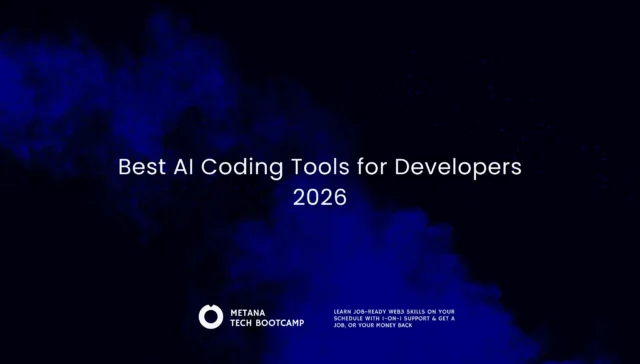TL;DR
- Coding jobs in 2025 are in high demand due to advancements in AI, blockchain, and cloud computing.
- Top roles include software developer, AI/ML engineer, blockchain developer, cloud engineer, cybersecurity developer, full-stack developer, and game developer.
- Emerging niches: quantum computing, AR/VR, and IoT development.
- Key skills: Python, JavaScript, DevOps tools, and soft skills like problem-solving.
- Industries hiring: tech, finance, healthcare, gaming, and more.
- Steps to land a job: build a portfolio, contribute to open-source, network, and upskill.
- Salaries range from $80K (entry-level) to $150K+ for specialized roles.
The Job Market for Coding Jobs in 2025
The job market for coding jobs is thriving, with a projected 22% growth in software development roles from 2020 to 2030. Key trends shaping the landscape include:
- Remote Work: Many companies offer fully remote or hybrid coding jobs, expanding access to global talent.
- AI Integration: AI is transforming industries, creating demand for specialized coding roles.
- Specialized Skills: Expertise in emerging fields like blockchain and quantum computing is highly valued.
Median salaries for coding jobs range from $80,000 for entry-level roles to $150,000+ for specialized positions, depending on location and expertise.
Top Coding Jobs to Pursue in 2025
Here are the most in-demand coding jobs in 2025, each with unique roles and skill requirements:
- Software Developer
- Role: Build applications, websites, or systems for various platforms.
- Key Skills: JavaScript, Python, Java, C++.
- Industries: Tech, finance, healthcare, education.
- AI/ML Engineer
- Role: Develop machine learning models and AI algorithms.
- Key Skills: Python, TensorFlow, PyTorch, data science.
- Industries: AI startups, automotive, retail.
- Blockchain Developer
- Role: Create decentralized apps and smart contracts.
- Key Skills: Solidity, Rust, Ethereum.
- Industries: Finance, supply chain, gaming.
- Cloud Engineer
- Role: Manage cloud infrastructure and services.
- Key Skills: AWS, Azure, Docker, Kubernetes.
- Industries: IT, e-commerce, enterprise solutions.
- Cybersecurity Developer
- Role: Secure software and systems against cyber threats.
- Key Skills: C, Python, ethical hacking.
- Industries: Government, finance, tech.
- Full-Stack Developer
- Role: Handle both front-end and back-end development.
- Key Skills: React, Node.js, MongoDB, SQL.
- Industries: Startups, digital agencies, tech giants.
- Game Developer
- Role: Design and code video games or interactive experiences.
- Key Skills: Unity, C#, Unreal Engine.
- Industries: Gaming, entertainment, education.
Emerging and Niche Coding Jobs
Niche coding jobs are gaining traction as new technologies mature. These roles offer exciting opportunities for early adopters:
- Quantum Computing Developer
- Role: Program quantum computers for complex computations.
- Key Skills: Qiskit, quantum algorithms.
- Industries: Research, tech, finance.
- AR/VR Developer
- Role: Create immersive augmented and virtual reality experiences.
- Key Skills: Unity, C#, 3D modeling.
- Industries: Gaming, education, real estate.
- IoT Developer
- Role: Build ecosystems for connected devices.
- Key Skills: Python, embedded systems, MQTT.
- Industries: Smart homes, healthcare, manufacturing.
Essential Skills for Coding Jobs in 2025
Success in coding jobs requires a blend of technical and soft skills. Here’s what you need:
- Programming Languages:
- Python: Versatile for AI, web, and automation.
- JavaScript: Essential for web development.
- Java/C++: Widely used in enterprise and systems programming.
- Solidity/Rust: Critical for blockchain.
- Go: Growing in cloud and backend development.
- Frameworks and Tools:
- React/Node.js for full-stack development.
- TensorFlow/PyTorch for AI/ML.
- AWS/Azure for cloud engineering.
- Docker/Kubernetes for DevOps.
- Soft Skills:
- Problem-solving for debugging and innovation.
- Collaboration for agile team environments.
- Adaptability to keep up with evolving tech.
- Certifications:
- AWS Certified Developer.
- Google Professional Machine Learning Engineer.
- Certified Ethical Hacker (CEH).
Where to Learn Coding for 2025
To prepare for coding jobs in 2025, leverage reputable online platforms and bootcamps that offer structured learning paths, hands-on projects, and career support. Here are the top resources:
- Metana: Delivers intensive coding bootcamps specializing in web3, full-stack, and blockchain development. Its project-based curriculum and mentorship help learners create portfolios for roles like blockchain and full-stack developers.
- Coursera: Offers courses from universities and tech firms, covering Python, JavaScript, AI, and cloud computing. Ideal for structured learning and certifications to boost programming careers.
- Udemy: Provides affordable, self-paced courses on programming languages, frameworks, and DevOps tools. Perfect for beginners and professionals upskilling for tech roles.
- freeCodeCamp: A free, community-driven platform with interactive tutorials on web development, JavaScript, and data science. Great for building practical skills for coding opportunities.
- Codecademy: Features beginner-friendly courses on Python, JavaScript, and full-stack development, with hands-on projects to prepare for programming roles.
- General Assembly and Le Wagon: Bootcamps with immersive programs in software engineering and data science, including career coaching to secure tech positions.
- X Communities: Engage with tech discussions and tutorials on X to stay updated on trends and access free resources, especially for emerging fields like AI and blockchain.
Industries Hiring for Coding Jobs
Coding jobs span a wide range of sectors, each with unique demands:
- Tech Giants: Google, Amazon, and Microsoft hire for software, AI, and cloud roles.
- Emerging Sectors:
- Fintech: Companies like Stripe and PayPal need blockchain and payment system developers.
- Healthtech: Telemedicine and medical data platforms require secure coding expertise.
- Edtech: Online learning platforms seek developers for interactive tools.
- Freelance/Remote Work: Platforms like Upwork, Freelancer, and X offer remote coding jobs globally.
- Startups: Early-stage companies need versatile coders for innovative products.
Steps to Land a Coding Job in 2025
Breaking into coding jobs requires preparation and strategy. Follow these steps:
- Build a Portfolio: Showcase projects on GitHub or a personal website. Include apps, websites, or AI models to demonstrate skills.
- Contribute to Open Source: Collaborate on projects to gain experience and credibility.
- Network: Attend hackathons, tech meetups, or join online communities on X or Discord.
- Upskill: Enroll in coding bootcamps (e.g., General Assembly, Le Wagon) or take online courses.
- Tailor Your Resume: Use keywords like coding jobs to pass applicant tracking systems (ATS).
Salary and Career Growth for Coding Jobs
Salaries for coding jobs in 2025 vary by role and experience:
- Entry-Level: Software developers earn ~$80,000 annually.
- Specialized Roles: AI/ML engineers and blockchain developers earn $120,000-$150,000+.
- Senior Roles: Tech leads and engineering managers can exceed $200,000 in high-demand markets.
Career paths are robust. A junior developer can progress to senior developer, tech lead, or CTO with experience and upskilling. The stability and remote flexibility of coding jobs ensure long-term growth.
Why Coding Jobs Are a Great Career Choice in 2025
Coding jobs in 2025 offer unmatched opportunities due to technological innovation and global demand. From AI to blockchain, there’s a role for every interest and skill level. Competitive salaries, remote work options, and diverse industries make coding jobs a rewarding career path. Start by learning in-demand skills, building a portfolio, and engaging with tech communities to seize these opportunities.
Frequently Asked Questions About Coding Jobs
- What are the highest-paying coding jobs in 2025?
- AI/ML engineers, blockchain developers, and cloud engineers top the list, often earning $120,000+.
- Do I need a degree for coding jobs?
- A degree helps but isn’t mandatory. Skills, portfolios, and certifications are often enough.
- How can I transition into coding jobs with no experience?
- Learn Python or JavaScript, build projects, and consider bootcamps or online courses.







